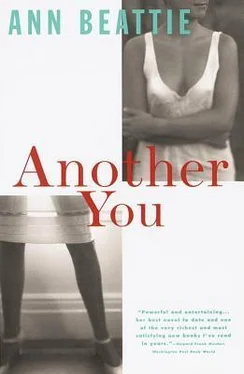Ann Beattie - Another You
Здесь есть возможность читать онлайн «Ann Beattie - Another You» весь текст электронной книги совершенно бесплатно (целиком полную версию без сокращений). В некоторых случаях можно слушать аудио, скачать через торрент в формате fb2 и присутствует краткое содержание. Год выпуска: 2014, Издательство: Vintage Books, Жанр: Современная проза, на английском языке. Описание произведения, (предисловие) а так же отзывы посетителей доступны на портале библиотеки ЛибКат.
- Название:Another You
- Автор:
- Издательство:Vintage Books
- Жанр:
- Год:2014
- ISBN:нет данных
- Рейтинг книги:5 / 5. Голосов: 1
-
Избранное:Добавить в избранное
- Отзывы:
-
Ваша оценка:
- 100
- 1
- 2
- 3
- 4
- 5
Another You: краткое содержание, описание и аннотация
Предлагаем к чтению аннотацию, описание, краткое содержание или предисловие (зависит от того, что написал сам автор книги «Another You»). Если вы не нашли необходимую информацию о книге — напишите в комментариях, мы постараемся отыскать её.
Another You — читать онлайн бесплатно полную книгу (весь текст) целиком
Ниже представлен текст книги, разбитый по страницам. Система сохранения места последней прочитанной страницы, позволяет с удобством читать онлайн бесплатно книгу «Another You», без необходимости каждый раз заново искать на чём Вы остановились. Поставьте закладку, и сможете в любой момент перейти на страницу, на которой закончили чтение.
Интервал:
Закладка:
Marshall did look at him impartially. He saw Gordon, drunker than he’d realized, so that now he understood Gordon had been drinking as he’d talked to Mr. Watanabe. The years of sunlight and drinking had permanently reddened his brother’s face. He was losing his hair, and he’d aged — it seemed as if he’d aged ten years in the time since Marshall had last seen him. When Beth first met Gordon, Gordon had probably looked worse than Marshall realized. Yet he did not think he was the only impartial observer who would understand that Gordon was acting a part. He was playing a role, using language that did not come naturally, but doing a credible imitation of a lowlife, all right. He had the right clothes, the macho bravado, the beer bottle prop, even the right wife. Beneath the facade, Marshall saw the watchfulness, the steadiness, of his older brother. It was interesting that as they became adults, both of them had chosen a slightly mocking attitude: Marshall mocked himself, he supposed, in the way he addressed his young students by putting their names in implied quotes, communicating that they all — himself included — had become marginal people, attempting to better understand the human condition through the careful reading of literature, which for all intents and purposes was no longer a currency in which the real world traded. “The real world,” of course, was also something deserving of mockery: the masses — idiotic tourists who could not understand what they were looking at, let alone what it signified, as they regarded the big fish at the end of The Old Man and the Sea . Literature was the study of Them by Us. It was undertaken by people smart enough to make a microscope of the page — or, more fashionably, to assert that things could shake out any number of ways because the page was a kaleidoscope. That was what they were taught by McCallum. He, too, tried to instill a sense of self-doubt in his students, though his approach wasn’t as fashionable as McCallum’s. It was his strategy to point out to them that they were America’s elite, to stress that the future was in their hands. The students smart enough to understand his tone would get the real message almost immediately — that he actually meant to instill doubt about one’s importance by pretending to insist on the supremacy of the self. So amusing, to send them out of the classroom having proved to them they were the elite, while having twisted that term into a dirty word; graduate, and they become the entirely dismissable elite — those who have seen the world in its variety and its complexity, but once their little group disperses, no one in that now opened-up, fascinating, complex world would care any longer what questions they raised, what conclusions they reached. The world would continue to operate in terms of dirty politics, opposing religions, wars, insider trading, freakish accidents, and the sale of lottery tickets. His benediction to them, last class: Goodbye, and good luck. Watch out for Answered Prayers. And if you must pray, don’t eat lunch with the next Truman Capote.
Well, all right: interesting that once Gordon was seen clearly, he could see himself more clearly, also. Two mocking people: he used a vehicle, language, to mock; his brother lived his life by invoking a stereotype he knew was absurd. Gordon had done Marshall one better; he had lived his entire life in apologetic quotes to call attention to the absurdity of his position. This much was entirely clear. The only problem was that he couldn’t announce this revelation to Gordon, because Gordon had invested everything in keeping people at a distance through the pretense of being crude.
Their father had excelled at keeping others at arm’s length, also, but his method had been to intimidate by imperiousness, while Gordon had decided to be a beer-swigging good ole boy. Their parents — their father, their mother, Evie — would not recognize Gordon now. It was only an act, though, meant to be repellent. Underneath, Gordon was still observant and insightful. He looked at his brother and thought about what Gordon had said the first night he arrived in Key West. It was true: their father had married someone not at all like him. Though Evie had not been much like him either, the friction between them had still never been as obvious as the contention between his father and mother. If his father had put his hopes in either of them, it had been Gordon, but he sensed his mother cared more what became of him. Or should he see it differently now? Was it just a case of a mother’s favoring her baby? That had been what his father said to his mother, that night. He had heard them arguing — had run upstairs because they were arguing. He had been in the kitchen with Gordon, and then he had pushed his chair back from the table and run upstairs — how embarrassing, to remember his endless cowardice — and Evie had risen to leave as well, only to be called back into the kitchen by their father. It became a three-way argument, Evie calling his father a bully, his father complaining about their mother’s love for him, Marshall — all her love reserved for the person he humiliatingly called “the baby.” All she cared about was the baby, he remembered his father saying. She was obsessed with the baby, ruining their lives with her preoccupation with the baby — though it was an unfair criticism; she had not been as focussed on him as his father insisted. It might have been true that Evie fussed over him slightly more, but his father had not been objecting to that — it was quite specifically his mother’s attentions toward Marshall “the baby” that had infuriated their father that night.
A plane coming toward the airport descended quickly, motors roaring, and Marshall looked at it, there below the clouds. What a sky, blue with white clouds, the ideal sky, the sort of sky that was supposed to make people feel life was miraculous. Instead, the vastness of the mesmerically blue sky made him think that his birth had been an accident. Of course it had been: the perfect son already existed, and his mother’s attentions toward him — her attentions toward Marshall-the-Baby — clearly incensed his father. There was every probability his father had not wanted a second child; especially not one who was emotional, cowardly, his nose always in a book, welded to his brother’s side — not even clinging to their father, but dependent on Gordon, which must have offended their father. He had blocked out that night for so long for the obvious reason that he found it all so painful — his role in disturbing the family, his being the center of attention even when he absented himself, the thorn in his father’s side. That was why their father had insisted on talking about his wife’s having favorites when she was terminally ill — that was why he insisted on telling her her deficiencies as she was preparing to tell her sons she was going to die.
“Gordon,” Marshall said, “do you think he loved her?”
“The Texan?” Gordon said.
He looked at his brother. Gordon had pulled the brim of his cap low over his eyes and was resting, one knee crossed over another, hands clasped on his stomach. Amazing but not surprising: Gordon’s thoughts really did not return to their parents — to that time or that place. Certainly not to that night.
“Yeah, the Texan,” Marshall said, for the hell of it.
“Mm,” Gordon said. “He probably loves her. Yeah.”
“Do you think our father loved our mother?”
He could hear the slight annoyance, mixed with resignation, as Gordon sighed, “No. I doubt it.”
“Evie?” Marshall said.
“What’s this? Cupid’s love survey?”
“What do you think?” Marshall persisted.
“What does it matter?”
“I’m curious.”
“I realize that. How about going into the store and getting us a couple of beers? I want to take a ten-minute catnap, then maybe we can wander over to Mallory Dock, give you the required touristic experience of watching the performers and the tourists strutting their stuff as the sun goes down. Beth’s selling air plants for a friend who’s out of town. You know what? I think Beth is a good person. I’m fond of her. I admire her. But I don’t think I love her, if I ever did.”
Читать дальшеИнтервал:
Закладка:
Похожие книги на «Another You»
Представляем Вашему вниманию похожие книги на «Another You» списком для выбора. Мы отобрали схожую по названию и смыслу литературу в надежде предоставить читателям больше вариантов отыскать новые, интересные, ещё непрочитанные произведения.
Обсуждение, отзывы о книге «Another You» и просто собственные мнения читателей. Оставьте ваши комментарии, напишите, что Вы думаете о произведении, его смысле или главных героях. Укажите что конкретно понравилось, а что нет, и почему Вы так считаете.












